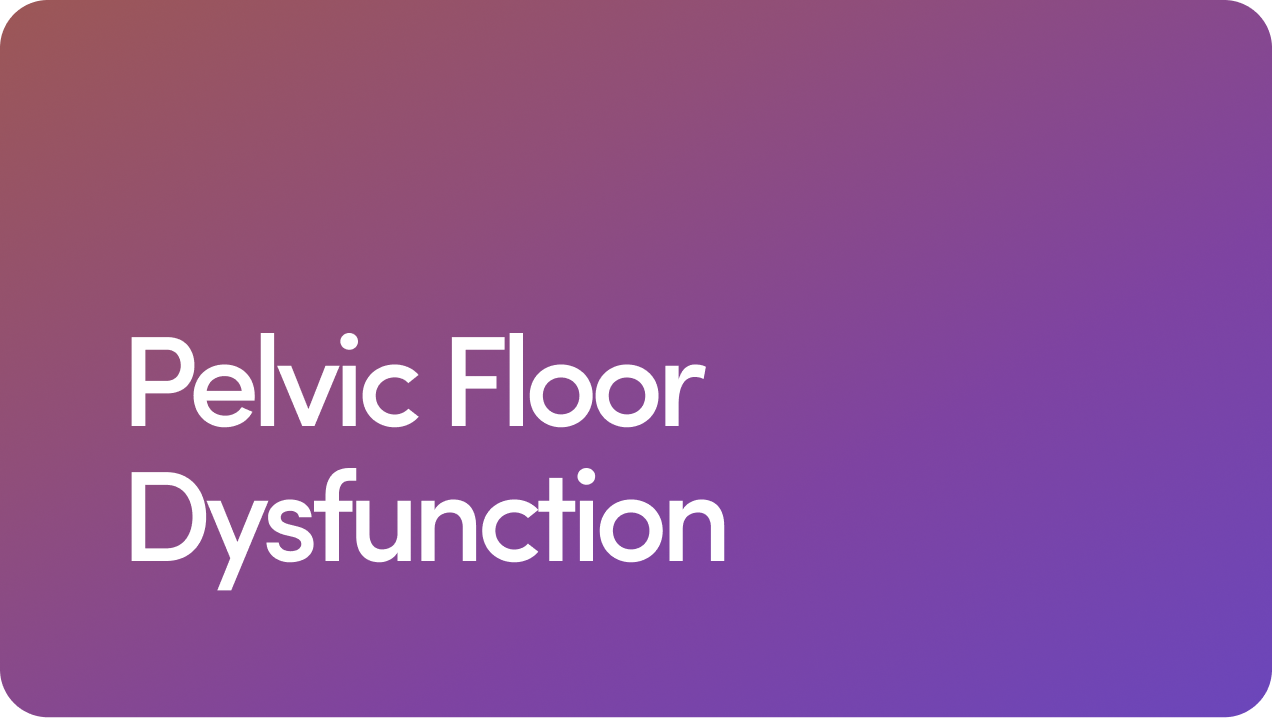Content
Enjoy sex like you used to
Can a Hernia Cause Erectile Dysfunction (ED)?

If you’ve ever had a hernia, a medical condition that causes internal organs to protrude outward, you may have felt too uncomfortable to have sex. But can a hernia cause erectile dysfunction (ED)? What about hernia surgery?
Having an inguinal or groin hernia or recovering from surgery for these issues could affect erectile function — mainly because of the location of the hernia. It’s a little too close for comfort.
Fortunately, various treatments can help. Keep reading to learn what a hernia is, how it impacts your sexual life, and what you can do to feel like yourself again.
Content
What Is a Hernia?
A hernia is a bulge or swelling that happens when an internal organ protrudes through the muscle or tissue that contains it. It typically affects the area between the chest and hips, known as the abdominal wall.
There are many potential causes of hernias. For instance, they can result from weakened muscles and strain from lifting heavy objects. You can also develop a hernia — specifically an umbilical hernia — if you have an overweight BMI (body mass index) or a long-lasting cough.
Types of Hernias
Some common types of hernias include:
Inguinal hernia. This type of hernia happens in the inguinal canal when fatty tissue or part of the intestine protrudes into the groin area near the top of the inner thigh. In men, the inguinal canal leads the spermatic cord (the cable-like duct running to and from the testes) and blood vessels to the testicles.
Femoral hernia. A femoral hernia is part of the intestine or fatty tissue that pushes into the groin area, also at the top of the inner thigh. This type of hernia is less common than the inguinal variety and extremely rare in men.
Umbilical hernia. This type of hernia forms when fatty tissue or part of the intestine pushes through the belly button or navel.
Hernias are fairly common medical conditions, and around 75 percent are inguinal. Roughly 80 to 90 percent of inguinal hernias happen in men, and only five to seven percent are umbilical.
Symptoms of Hernias
Hernia symptoms can vary by person and type. An umbilical hernia, for example, may cause a mild ache or pain that worsens when the abdomen is put under strain, like while lifting weights or running.
Common signs of an inguinal hernia in men:
Groin pain
Pressure in the abdomen
A visible bulge or a bulge you can feel
Tugging sensation in the scrotum
As you might guess, the symptoms of an inguinal hernia can differ between men and women
Do Hernias Require Treatment?
Hernias usually don’t go away on their own and often need surgical repair to heal. Although men may put off inguinal hernia repair surgery if they don’t have symptoms, hernias can grow and cause more complications over time, especially if left untreated.
There are two options for inguinal hernia surgery.
Laparoscopic surgery. This minimally invasive inguinal surgery is a type of laparoscopic surgery, meaning small incisions are used in place of one large one. Recovery time is about two weeks.
Open surgery. With open surgery, a surgeon makes a larger incision directly at the location of the hernia. This operation has a longer recovery time of four to six weeks.
With either type of procedure, surgeons sometimes insert a synthetic mesh to support the weak spot. This is called a hernioplasty.
Inguinal hernia repair is common, accounting for about 800,000 surgeries yearly in the U.S.
Seeing that an inguinal hernia is more common in men and impacts the area closest to your sexual organs, you may be wondering, Can an inguinal hernia cause erectile dysfunction? What about the surgical procedure to repair it? We’ll go over this below.
Can a Hernia Cause ED?
Before we answer this question, here’s some information on ED.
Erectile dysfunction happens when a man is unable to get and maintain a firm erection for penetrative sexual intercourse. It’s a common issue, affecting about 30 million men in the United States. ED can show up at any age but most often affects older men.
Contributing factors to erectile dysfunction range from psychological reasons like stress to underlying health issues like cardiovascular disease and low testosterone (sometimes called “low T”).
What about a hernia? Can a hernia cause erectile dysfunction?
Although hernias aren’t known to directly cause ED, some guys may experience sexual dysfunction after a hernia, particularly if they’re in pain.
A small study published in the International Journal of Urology found that just over 23 percent of hernia patients (both men and women) complained about preoperative sexual dysfunction — that is, before getting the hernia surgically removed.
Can a Hernia Cause Low Testosterone?
We mentioned that another contributing factor to ED is low testosterone. But can a hernia affect testosterone levels? The short answer is no.
That said, some limited animal research shows that low T may increase the risk of developing a hernia due to reduced muscle mass. This could then cause pain that contributes to ED, but it’s a weak correlation.
For now, there’s not enough evidence to say a hernia has any impact on testosterone production.
People may also experience sexual dysfunction or chronic pain after hernia surgery. The above study found that 16 percent of patients had sexual dysfunction after inguinal hernia repair.
Pain During Sex
A 2020 review of 12 different studies on inguinal hernia surgery and men’s sexual health found that sexual dysfunction was an issue for five percent of male patients after hernia surgery. Meanwhile, nine percent experienced severe pain during sexual activity.
The pain during sex after surgery could be because of the mesh used in hernia repair. It might also be that a nerve is caught in the mesh.
Hardening of Soft Tissue in Groin Area
Surgical repair for an inguinal hernia may also impact sexual activity.
The mesh repair could lead to long-term tissue induration — that’s when soft tissue near the surgical site hardens. This could affect sexual function, according to a 2016 study published in the Central European Journal of Urology.
However, the same study shows that inguinal hernia surgery eventually improves sexual function compared to how things were before the operation.
Bruised or Swollen Scrotum
Bruising and swelling of the scrotum, base of the penis, and testicles can also happen to some patients after open or laparoscopic surgery for a hernia. But these symptoms should gradually fade on their own.
Can You Have Sex After Hernia Surgery?
There typically aren’t any medical or physical restrictions on sexual activity after surgery. Still, patients should let any pain or discomfort guide their decisions, as sex might be uncomfortable at first.
You should also consult your healthcare provider about the recovery process if you’re going through a hernia repair.
Though there have been reports of patients with pain after hernia surgery, the chance of an inguinal hernia causing sexual dysfunction is actually very low.
Despite being near the reproductive organs, the inguinal canal is separate, which means it has its own nerves. Luckily, this means the nerves in the inguinal canal are the only ones affected by an inguinal hernia and the surgery to repair it.
You may be more likely to experience pain or issues with sexual function if you don’t properly treat a hernia with surgery.
However, if you have symptoms of erectile dysfunction, you may want to look into other possible causes. Fortunately, ED is one of the easiest forms of sexual dysfunction to treat, either with FDA-approved medications, non-pharmaceutical treatments, or a mix of both.
How to Treat ED After Hernia Surgery
If you’re experiencing ED after a hernia surgery, your provider may recommend different treatment options to improve your sexual function and quality of life. These can include ED medications, psychological treatments, or both. Your provider might also discuss prevention methods with you.
ED Medications
If hernia surgery has impaired your sexual function, your healthcare provider may prescribe oral medication. Options include:
Sildenafil (the active ingredient in Viagra®)
Vardenafil (Levitra®)
Avanafil (Stendra®)
Viagra® (and generic sildenafil) is one of the most common medications on the market. Like other ED medications, it improves erectile function by increasing blood flow to the penis.
If you want to learn about other options, check out our guide on the latest ED treatments.
Pain Medication After Hernia Surgery
If you undergo hernia surgery, you might be instructed to take a painkiller to help with tenderness or swelling of the scrotum.
There are generally no drug interactions between pain medication and ED medication. But check with your healthcare provider if you have any questions or concerns about taking one of these meds after hernia surgery.
Psychological Treatment
It’s possible that your ED symptoms aren’t solely the result of hernia surgery but rather a psychological issue, like depression or sexual performance anxiety. If so, there are treatment options to help you work through whatever’s going on.
These include counseling, cognitive behavioral therapy (CBT), couples therapy, or sex therapy. Psychotherapy involves exploring the mental and emotional factors that contribute to ED and learning to change negative thought patterns.
ED Prevention
No matter what health issues you have or don’t have, you can always make lifestyle changes to reduce the risk of developing erectile dysfunction in the future.
These lifestyle habits include:
Exercising regularly
Following a healthy diet
Maintaining a healthy weight
Drinking moderately
Reducing stress levels
Explore the causes and treatments for temporary erectile dysfunction in our blog.
While having a hernia can undoubtedly cause pain or discomfort (especially if left untreated), there’s not much evidence that a hernia causes erectile dysfunction.
You might experience pain or discomfort after hernia repair surgery that leads to sexual dysfunction, but erectile dysfunction is a bit of a stretch.
Remember:
A hernia doesn’t directly cause erectile dysfunction. However, hernias can cause pain that may impact sexual function.
Hernia surgery might temporarily affect erectile function. Surgical repair for a hernia may cause pain or swelling that contributes to ED, but these symptoms should fade over time. Always consult your healthcare provider if you’re experiencing sexual dysfunction after surgery.
Treatments for hernias and erectile dysfunction are available. They may include things like surgery, medication, therapy, or a combination of treatments.
In any case, your first step should be contacting a healthcare provider and telling them what’s going on. They can take a closer look at the symptoms you’re experiencing and help you find the treatment you need.
If you want to improve your sex life and address any roadblocks, start today with our quick virtual sexual health assessment.
14 Sources
- Bjurstrom M, et al. (2014). Pain control following inguinal herniorrhaphy: current perspectives. https://www.ncbi.nlm.nih.gov/pmc/articles/PMC4045265/
- Conze J, et al. (2001). Hernias. https://www.ncbi.nlm.nih.gov/books/NBK6888/
- Johns Hopkins Medicine. (n.d.). Inguinal hernia. https://www.hopkinsmedicine.org/health/conditions-and-diseases/hernias/inguinal-hernia
- Maiorino M, et al. (2015). Lifestyle modifications and erectile dysfunction: What can be expected?. https://www.ncbi.nlm.nih.gov/pmc/articles/PMC4291878/
- National Institute of Diabetes and Digestive and Kidney Diseases (NIDDK). (2017). Definition & facts for erectile dysfunction. https://www.niddk.nih.gov/health-information/urologic-diseases/erectile-dysfunction/definition-facts
- Society of American Gastrointestinal and Endoscopic Surgeons (SAGES). (n.d.). Inguinal hernia repair surgery patient information from SAGES. https://www.sages.org/publications/patient-information/inguinal-hernia-repair-surgery-patient-information-from-sages/
- Sönmez M, et al. (2016). Does inguinal hernia repair have an effect on sexual functions?. https://www.ncbi.nlm.nih.gov/pmc/articles/PMC4986302/
- Ssentongo A, et al. (2020). Pain and dysfunction with sexual activity after inguinal hernia repair: systematic review and meta-analysis. https://pubmed.ncbi.nlm.nih.gov/31733327/
- Tuma F, et al. (2021). Anatomy, abdomen and pelvis, inguinal region (inguinal canal). https://www.ncbi.nlm.nih.gov/books/NBK470204/
- University Hospitals. (n.d.). Laparoscopic inguinal hernia surgery care instructions. https://www.uhhospitals.org/services/surgery-services/conditions-and-treatments/hernia-surgery/patient-resources/postoperative-instructions/groin-inguinal-hernias/laparoscopic-inguinal-hernia-surgery-care-instructions
- U.S. Food and Drug Administration (FDA). (2018). Hernia surgical mesh implants. https://www.fda.gov/medical-devices/implants-and-prosthetics/hernia-surgical-mesh-implants
- Viagra (sildenafil citrate) tablets. (2007). https://www.accessdata.fda.gov/drugsatfda_docs/label/2007/020895s027lbl.pdf
- Zhao H, et al. (2018). Shift from androgen to estrogen action causes abdominal muscle fibrosis, atrophy, and inguinal hernia in a transgenic male mouse model. https://pubmed.ncbi.nlm.nih.gov/30327348/
- Zieren J, et al. (2005). Sexual function before and after mesh repair of inguinal hernia. https://onlinelibrary.wiley.com/doi/abs/10.1111/j.1442-2042.2004.00983.x
Editorial Standards
Hims & Hers has strict sourcing guidelines to ensure our content is accurate and current. We rely on peer-reviewed studies, academic research institutions, and medical associations. We strive to use primary sources and refrain from using tertiary references. See a mistake? Let us know at [email protected]!
This article is for informational purposes only and does not constitute medical advice. The information contained herein is not a substitute for and should never be relied upon for professional medical advice. Always talk to your doctor about the risks and benefits of any treatment. Learn more about our editorial standards here.

Kelly Brown MD, MBA
Dr. Kelly Brown is a board certified Urologist and fellowship trained in Andrology. She is an accomplished men’s health expert with a robust background in healthcare innovation, clinical medicine, and academic research. Dr. Brown was previously Medical Director of a male fertility startup where she lead strategy and design of their digital health platform, an innovative education and telehealth model for delivering expert male fertility care.
She completed her undergraduate studies at University of North Carolina at Chapel Hill (go Heels!) with a Bachelor of Science in Radiologic Science and a Minor in Chemistry. She took a position at University of California Los Angeles as a radiologic technologist in the department of Interventional Cardiology, further solidifying her passion for medicine. She also pursued the unique opportunity to lead departmental design and operational development at the Ronald Reagan UCLA Medical Center, sparking her passion for the business of healthcare.
Dr. Brown then went on to obtain her doctorate in medicine from the prestigious Northwestern University - Feinberg School of Medicine and Masters in Business Administration from Northwestern University - Kellogg School of Management, with a concentration in Healthcare Management. During her surgical residency in Urology at University of California San Francisco, she utilized her research year to focus on innovations in telemedicine and then served as chief resident with significant contributions to clinical quality improvement. Dr. Brown then completed her Andrology Fellowship at Medical College of Wisconsin, furthering her expertise in male fertility, microsurgery, and sexual function.
Her dedication to caring for patients with compassion, understanding, as well as a unique ability to make guys instantly comfortable discussing anything from sex to sperm makes her a renowned clinician. In addition, her passion for innovation in healthcare combined with her business acumen makes her a formidable leader in the field of men’s health.
Dr. Brown is an avid adventurer; summiting Mount Kilimanjaro in Tanzania (twice!) and hiking the incredible Torres del Paine Trek in Patagonia, Chile. She deeply appreciates new challenges and diverse cultures on her travels. She lives in Denver with her husband, two children, and beloved Bernese Mountain Dog. You can find Dr. Brown on LinkedIn for more information.
Education & Training
Andrology Fellowship, Medical College of Wisconsin
Urology Residency, University of California San Francisco
M.D. Northwestern University Feinberg School of MedicineB.S. in Radiologic Science, Chemistry Minor, University of North Carolina at Chapel Hill
Research
Published as Kelly Walker
Cowan, B, Walker, K., Rodgers, K., Agyemang, J. (2023). Hormonal Management Improves Semen Analysis Parameters in Men with Abnormal Concentration, Motility, and/or Morphology. Fertility and Sterility, Volume 118, Issue 5, e4. https://www.sciencedirect.com/journal/fertility-and-sterility/vol/120/issue/1/suppl/S
Walker, K., Gogoj, A., Honig, S., Sandlow, J. (2021). What’s New in Male Contraception? AUA Update Series, Volume 40. https://auau.auanet.org/content/update-series-2021-lesson-27-what%E2%80%99s-new-male-contraception
Walker, K., Shindel, A. (2019). AUA Erectile Dysfunction Guideline. AUA Update Series, Volume 38. https://auau.auanet.org/content/course-307
Walker, K., Ramstein, J., & Smith, J. (2019). Regret Regarding Fertility Preservation Decisions Among Male Cancer Patients. The Journal of Urology, 201(Supplement 4), e680-e681. https://www.auajournals.org/doi/10.1097/01.JU.0000556300.18991.8e
Walker, K., & Smith, J. (2019). Feasibility Study of Video Telehealth Clinic Visits in Urology. The Journal of Urology, 201(Supplement 4), e545-e545. https://www.auajournals.org/doi/10.1097/01.JU.0000556071.60611.37
Related Articles
Related Conditions
 Erectile Dysfunction
Erectile Dysfunction
 Premature Ejaculation
Premature Ejaculation
 Low Testosterone
Low Testosterone
 Retrograde Ejaculation
Retrograde Ejaculation
 Pelvic Floor Dysfunction
Pelvic Floor Dysfunction
 Anorgasmia
Anorgasmia